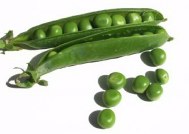Beans, Peas and Lentils
Your Health Guide
Health Guide addresses health issues and related subjects - healthy eating, exercises, etc.

Beans, peas and lentils - so much more than you thought they could be! They give variety and they come in all kinds
of attractive shapes, colours and flavours, opening the door to dozens of new and easy dishes including appetizers,
soups, snacks and salad.
And when you eat them, you are getting protein and fibre with only a fraction of the amount of fat you would find even
in lean meat. In recent years medical attention has been focussed on the possible role of dry beans in the diet for
the prevention and treatment of the degenerative diseases such as diabetes, heart disease and cancer, and as a
result they come highly recommended for good health.
Consumng a regular intake of beans, peas and lentils can provide the following health benefits:
They are rich in cholesterol lowering fibre.
Beans, peas and lentils contain a valuable source of insoluble and soluble fibre. Soluble fibre is known to effectively
lower blood cholesterol levels, thereby helping to reduce the risk of heart disease and stroke. Insoluble fibre promotes
regular bowel movements, so helping to guard against constipation, as well as lessening the risk of bowel cancer.
They are a valuable source of protein.
Beans, peas and lentils are all a good source of protein, although unlike meat, fish and eggs they do not contain
ideal amounts of all the essential amino acids necessary for growth and for maintaining muscle tissue and
organs. For this reason, vegetarians should serve beans and lentils together with other plant foods and whole
grains such as rice, bread or maize, to ensure the availability of a wider range of amino acids.
They are nutrient rich.
Beans, peas and lentils contain a wonderful combination of vitamins and minerals. They supply impressive amounts
of calcium, iron, zinc, potassium, phosphorus and B-vitamins. Beans also contain folic acid, a vitamin that has
been known to reduce the risk of some birth defects, protect against heart disease and it may even lower the risk
of certain types of cancer.
They can play a role in improved blood glucose control.
Dry beans, peas and lentils have a low Glycemic Index (GI), which is a rating of carbohydrate - containing foods
according to their actual effect on blood sugar levels. Once consumed, low GI foods such as beans, release the
glucose gradually into the bloodstream, and are therefore the optimal choice for people with diabetes and
hypoglycemia. It is the soluble fibre that slows the release of glucose into the bloodstream and this leads to a far
more effective blood glucose control. For those wanting to lose weight, the increased satiety - and the fact that
less insulin (a hormone that encourages fat storage) is secreted when consuming a low GI diet - can result
in more efficient fat loss.
They have a negligible fat content.
Their low fat content together with their satiety-enhancing effect make beans, peas and lentils an ideal
component of any weight reducing diet.
The preparation of dry beans, peas and lentils.
Don't be put off by the idea that you have to soak beans overnight, then cook them for hours. Firstly, you don't
have to soak them overnight(although that quickly becomes an easy routine). Instead you can bring them
to the boil in plenty of water, simmer them for three minutes, then turn off the heat and leave the beans for one
to two hours or until you want to cook them.
Secondly, there are some that don't need soaking at all. Lentils and black-eyed beans, for example, will cook
staight from the packet in about 25min and 40-45min respectively.
Thirdly, when you get used to using beans, it's no more difficult to cook up a batch in advance then it is to take
something out of the freezer or make a casserole the evening before you need it. Cooking a good-sized batch
means that you can eat some immediately, then have enough left over to make soup, or some burgers, or
a salad.
And then there are the canned and vacumm packed beans, peas and lentils - an ever-ready store of fresh cooked
full-of-goodness ingredients. All their natural goodness is safely locked in fresh just the way nature intended.
Canning takes place at the time of peak nutritional value and the produce is handled quickly. It is then held in a
controlled environment with minimal exposure to high temperatures. There is no need for the use of preservatives,
colourants or artificial flavourants in the canning of beans, peas and lenthils.